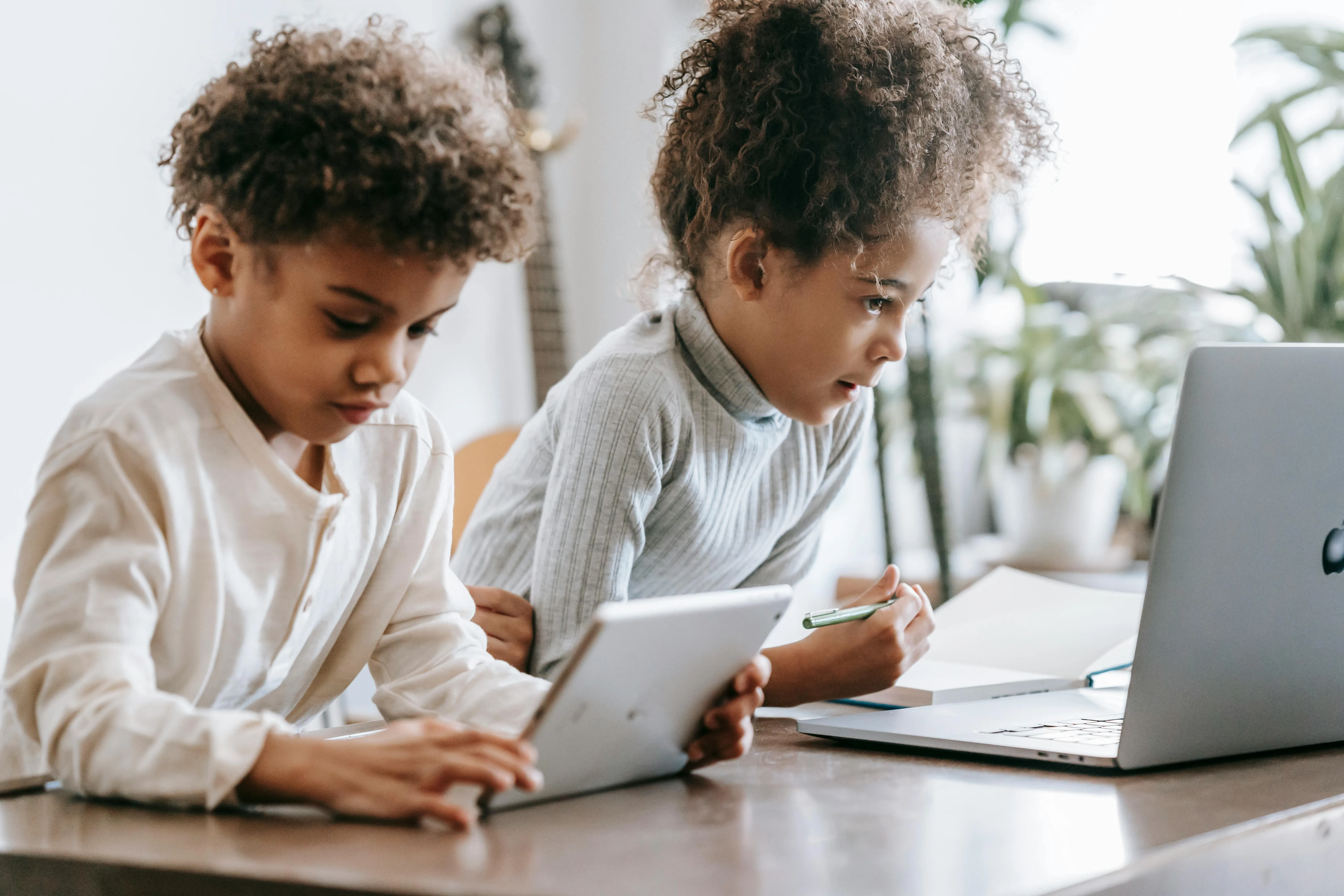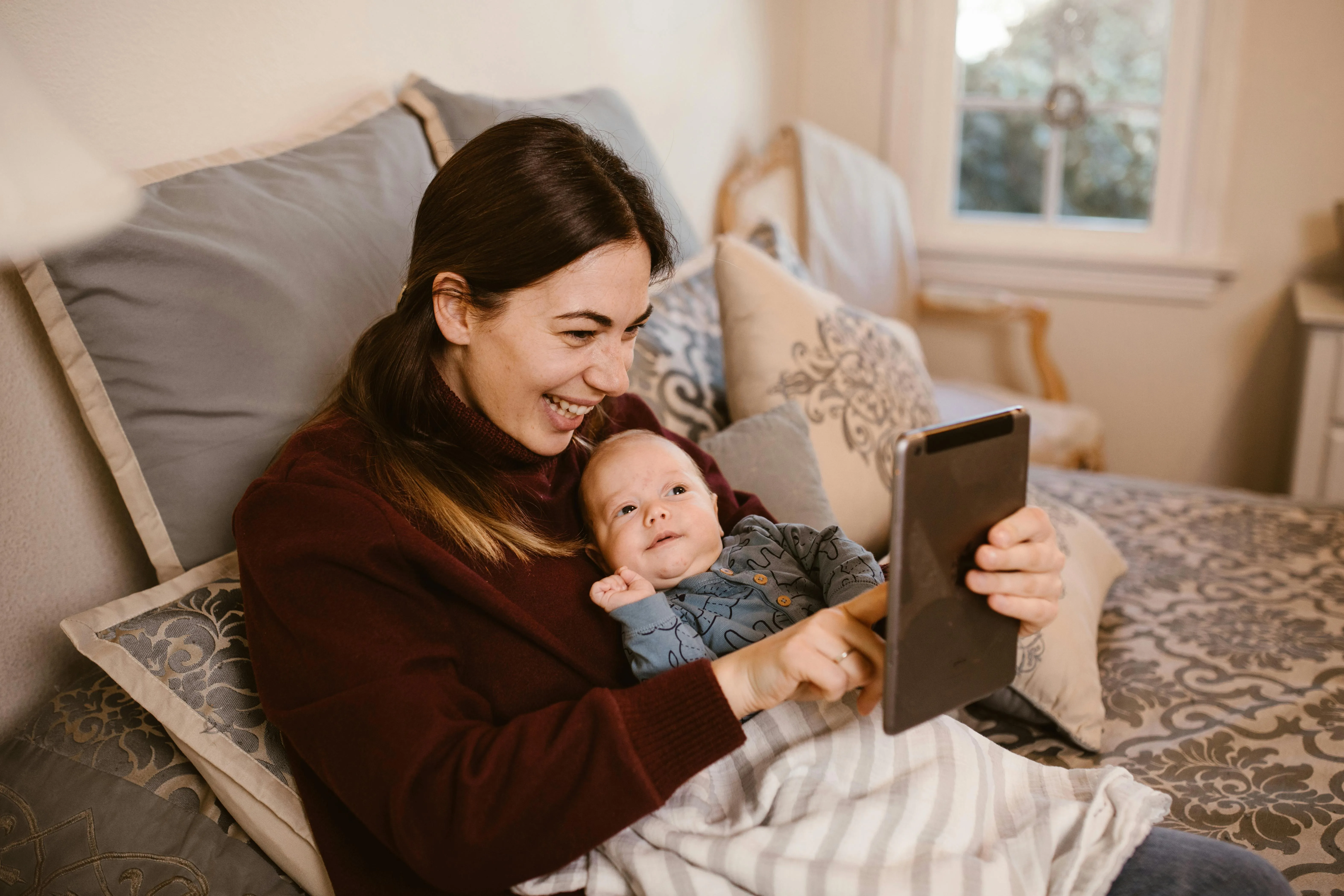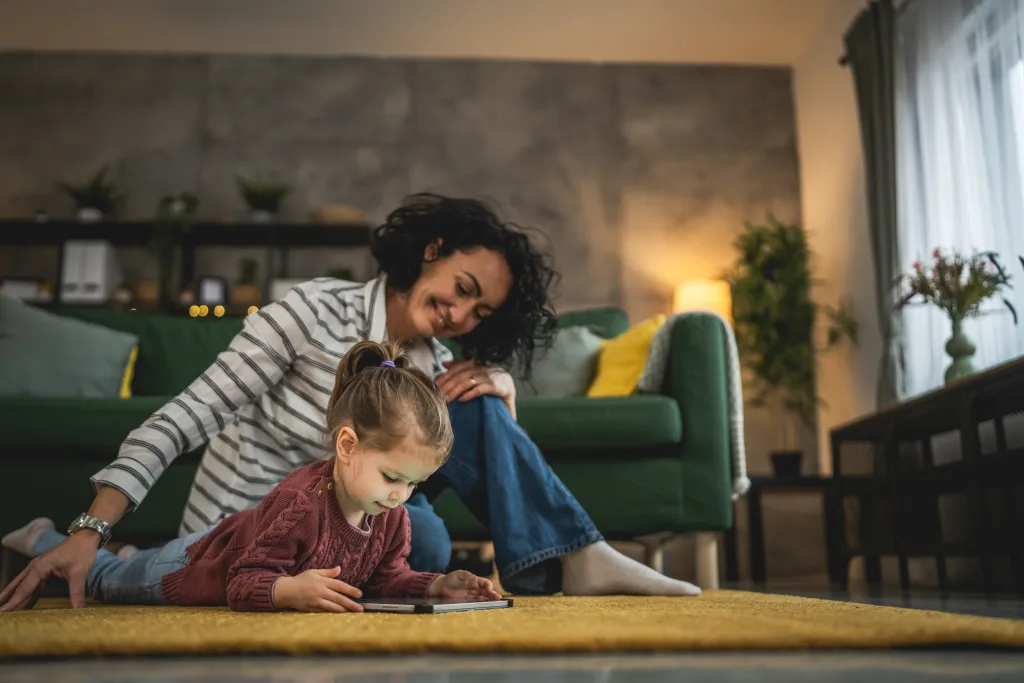Ever since ChatGPT and similar large language models made their debut a few years ago, people have found more and more everyday uses for it, from writing grocery lists to troubleshooting tech issues. For many, it’s become a sort of personal assistant, ready to help at a moment’s notice. And now, families are discovering how AI tools can support something even more personal: childcare.
Modern parenting has more moving pieces than ever: long work hours, changing school schedules, constant communication with teachers and doctors, and the daily juggle of meals, naps, appointments, and screen time. It’s a lot to keep track of. But with the rise of AI, parents and caregivers, including Au Pairs, now have new ways to stay organized and connected.
In this article, we’re sharing our views on how AI can complement the human side of childcare by helping with everyday tasks like creating routines and organizing activities. Plus, we’ll discuss what AI can’t replace, and share tips on how to use these tools thoughtfully and safely in family life. Read on!
What Is AI Parenting?
Before you start picturing a robot taking care of your children à la Rosie from The Jetsons, let’s bring it back to what AI parenting actually means. It’s a made-up phrase people use to describe how technology can support everyday childcare, not replace it.
AI parenting usually involves tools powered by artificial intelligence to help manage routines, offer suggestions, or solve small challenges. In many cases, these tools are already part of many families’ lives without even realizing it:
- Daily planner apps that adjust schedules automatically
- Voice assistants that help set timers, play music, or tell stories
- Translation tools that support multilingual communication with your Au Pair
- Recommendation engines that suggest age-appropriate games or activities
For busy households, AI tools can be a quick and simple solution to staying more organized, helping with kids’ learning, and making everyday tasks a little easier for both parents and Au Pairs.
Why It’s Gaining Popularity Among Families
Households are turning to smart tech because it simplifies the chaos of daily life, and childcare is no exception. AI is now present in everyday routines, helping parents and caregivers stay on top of everything without feeling overwhelmed by the nonstop demands.
For example, most US households now use smart baby monitors, and many prefer models with biometric features like breathing and sleep tracking through AI. Additionally, countless apps now include AI features for milestone tracking, sleep routines, and meal planning for babies, toddlers, and small children.

Practical Ways Families Use AI Today
AI-powered tools help manage routines, promote learning, and maintain safer digital environments. While these tools don’t replace a human caregiver, they can make daily life a little more manageable.
Here’s how:
Smart Assistants and Daily Routines
Smart assistants like Alexa, Google Assistant, and Siri can be used to help with everyday organization and family logistics. Families use them to:
- Set reminders for pickups, nap times, or chores
- Cue bedtime with calming music or white noise
- Answer homework questions on the spot
- Create shared to-do lists and sync calendars
- Come up with age-appropriate activity ideas
- Get help drafting behavior charts, sleep training steps, bedtime stories, or meal plans in seconds
These digital assistants are getting smarter by the day, making them more helpful, responsive, and intuitive for busy families.
AI-Powered Educational Tools for Kids
Many learning platforms now use AI to adapt to a child’s pace and skill level. These tools are engaging and can complement schoolwork, with options like:
- Language-learning apps with real-time pronunciation feedback
- Math games that adjust based on progress
- Homework tools that offer hints and step-by-step guidance
That said, these tools always work best when paired with real-world activities and caregiver support.
Parental Controls and Content Moderation
AI can also play a role in helping families manage screen time and digital safety. These tools quietly monitor and filter without constant supervision. Common features include:
- Kid-friendly search engines with automatic filters
- App trackers that monitor usage and time spent
- Content blockers that limit access to certain videos or websites
While they don’t replace active guidance, these features create a more age-appropriate, secure digital environment, giving parents and Au Pairs extra peace of mind.
How Au Pairs and AI Can Work Together to Support Families
No app or device can replace the value of human connection, especially when raising children. But the right tools can make that work easier. For many families, the partnership between an Au Pair and smart technology has become a winning combination because it blends the warmth and flexibility of a human caregiver with the structure and consistency that tech can offer behind the scenes.
Here’s how AI for families can work alongside Au Pairs to enhance home care, communication, and connection.

Combining Human Connection with Smart Technology
Au Pairs bring something to the table that no algorithm can replicate: empathy, presence, and meaningful cultural exchange. They adapt to a child’s needs in real time, respond with care and creativity, and engage in hands-on experiences that promote growth and bonding.
Conversely, AI supports structure and can sort out logistical problems faster than other tools. It remembers appointments, suggests endless age-appropriate activities, and helps organize busy days. Used together, AI and Au Pairs create a more organized experience for families, resulting in more time and energy for connection and less worrying about logistics.
Real-Life Scenarios Where AI Supports Au Pair Care
AI tools are already helping families stay more organized, creative, and connected. Here are some ways they can help your Au Pair provide better care for your children, too:
- Using a language app to help kids practice a second language through games and challenges
- Creating personalized bedtime stories with AI that feature the child’s name, favorite animal, or recent adventure
- Generating new activity ideas tailored to the child’s interests, like space-themed crafts for a budding astronaut or backyard “experiments” for a science-loving 6-year-old
- Using an AI calendar to coordinate nap times, playdates, and quiet-time blocks
- Keeping screen time educational with tools that recommend age-appropriate videos or learning games
These tools help Au Pairs stay organized and responsive, without replacing the one-on-one care they’re there to provide.
Building Stronger Communication Between Families and Au Pairs
AI can also support better communication within the household and give families and Au Pairs more ways to stay on the same page. Some Host Families use AI parenting tools to:
- Translate quick messages between Au Pairs and parents when working to overcome language barriers.
- Share calendars to keep routines visible for everyone.
- Share digital notes or daily recaps to track milestones or questions.
With the right support, families and Au Pairs can build trust more easily and work together more efficiently, leaving more room for care, learning, and fun.
What AI Can’t Replace: The Human Touch of Childcare
While there’s been much talk about AI over the past few years, both good and bad, one thing’s for sure: technology will never be able to replace the warmth, presence, and emotional intuition of a human caregiver.
AI might help organize routines or offer activity suggestions, but it can’t share a laugh, offer a hug, or really understand the nuances of a child’s mood. It can’t teach empathy through example, navigate the unpredictability of toddler tantrums, or build the kind of trust that grows through day-to-day moments.
Au Pairs give kids and Host Families something deeply personal: companionship, adaptability, and genuine care that supports children and families in ways no algorithm can. And at Go Au Pair, we celebrate this human connection as the heart of childcare.

Tips for Using Artificial Intelligence in Parenting Safely
There’s no denying that AI can be useful, but it’s not something you want to dive into blindly. Like any tool, it’s important to understand how it works and what it’s doing behind the scenes. The following tips can help parents and caregivers use AI in a way that’s helpful and safe, not invasive.
Privacy and Data Concerns
Most AI tools need data to work well, but not all apps are upfront about what they collect or how they use it. Be sure to protect your and your child’s personal information by:
- Reviewing app permissions and turning off anything you don’t need
- Adjusting smart speaker settings to limit recordings
- Using parental dashboards to check what your kids are accessing
- Sticking to tools with clear privacy policies and good reviews
Choosing the Right Tools for Your Family
There are a lot of AI-powered tools out there, but not everything is worth your time. Ask yourself:
- What is this actually helping with?
- Is it simple enough for everyone in the house to use?
- Does it collect data, and can I control it?
- Does it support how we already live and parent?
Try one thing at a time and see how it fits. If it makes daily life easier without adding stress or noise, it’s probably a good sign.
Embrace AI Parenting on Your Terms
Using AI as a parent can be a helpful way to take some of the mental load off, especially when things like planning meals, organizing routines, or coming up with activity ideas leave you with little to no room to breathe or be present.
The best tools feel like a natural fit; they support how your family already functions and give you more space to focus on what really matters.
If you’re looking for hands-on help that adds even more structure, care, and meaningful interactions into your home, explore how Go Au Pair supports families through thoughtful, human-centered child care. Explore profiles and find an Au Pair today.



